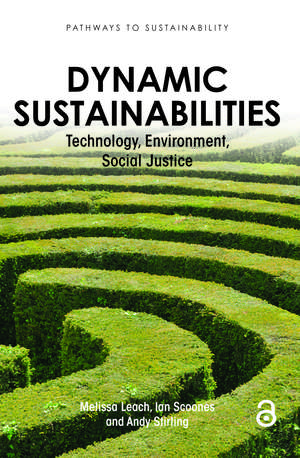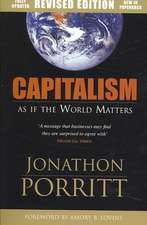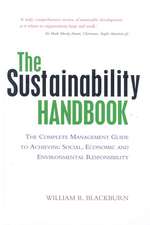Dynamic Sustainabilities: Technology, Environment, Social Justice: Pathways to Sustainability
Editat de Melissa Leach, Ian Scoones, Andy Stirlingen Limba Engleză Paperback – 23 apr 2010
This book lays out a new 'pathways approach' to address sustainability challenges such as these in today's dynamic world. Through an appreciation of dynamics, complexity, uncertainty, differing narratives and the values-based aims of sustainability, the pathways approach allows us to see how some approaches are dominant, even though they do not produce the desired results, and how to create successful alternative 'pathways' of responding to the challenges we face. As well as offering new ways of thinking about sustainability, the book also suggests a series of practical ways forward - in tools and methods, forms of political engagement, and styles of knowledge-making and communication. Throughout the book, the practicalities of the pathways approach are illustrated using four case studies: water in dryland India, agricultural seeds in Africa, responses to epidemic disease and energy systems/climate change. Published in association with the Economic and Social Research Council (ESRC).
| Toate formatele și edițiile | Preț | Express |
|---|---|---|
| Paperback (1) | 319.43 lei 6-8 săpt. | |
| Taylor & Francis – 23 apr 2010 | 319.43 lei 6-8 săpt. | |
| Hardback (1) | 1002.02 lei 6-8 săpt. | |
| Taylor & Francis – 23 apr 2010 | 1002.02 lei 6-8 săpt. |
Din seria Pathways to Sustainability
-
 Preț: 257.71 lei
Preț: 257.71 lei -
 Preț: 266.11 lei
Preț: 266.11 lei -
 Preț: 256.68 lei
Preț: 256.68 lei -
 Preț: 169.51 lei
Preț: 169.51 lei -
 Preț: 275.30 lei
Preț: 275.30 lei -
 Preț: 323.23 lei
Preț: 323.23 lei -
 Preț: 485.40 lei
Preț: 485.40 lei -
 Preț: 317.30 lei
Preț: 317.30 lei -
 Preț: 273.35 lei
Preț: 273.35 lei -
 Preț: 240.16 lei
Preț: 240.16 lei -
 Preț: 274.20 lei
Preț: 274.20 lei -
 Preț: 320.20 lei
Preț: 320.20 lei - 26%
 Preț: 762.97 lei
Preț: 762.97 lei -
 Preț: 272.37 lei
Preț: 272.37 lei -
 Preț: 273.57 lei
Preț: 273.57 lei -
 Preț: 322.27 lei
Preț: 322.27 lei -
 Preț: 274.45 lei
Preț: 274.45 lei - 17%
 Preț: 213.33 lei
Preț: 213.33 lei -
 Preț: 244.02 lei
Preț: 244.02 lei -
 Preț: 469.56 lei
Preț: 469.56 lei -
 Preț: 317.48 lei
Preț: 317.48 lei -
 Preț: 317.30 lei
Preț: 317.30 lei -
 Preț: 363.96 lei
Preț: 363.96 lei -
 Preț: 314.21 lei
Preț: 314.21 lei -
 Preț: 275.26 lei
Preț: 275.26 lei
Preț: 319.43 lei
Nou
Puncte Express: 479
Preț estimativ în valută:
61.13€ • 63.59$ • 50.47£
61.13€ • 63.59$ • 50.47£
Carte tipărită la comandă
Livrare economică 14-28 aprilie
Preluare comenzi: 021 569.72.76
Specificații
ISBN-13: 9781849710930
ISBN-10: 1849710937
Pagini: 232
Ilustrații: 1, black & white illustrations
Dimensiuni: 156 x 234 x 18 mm
Greutate: 0.36 kg
Ediția:1
Editura: Taylor & Francis
Colecția Routledge
Seria Pathways to Sustainability
Locul publicării:Oxford, United Kingdom
ISBN-10: 1849710937
Pagini: 232
Ilustrații: 1, black & white illustrations
Dimensiuni: 156 x 234 x 18 mm
Greutate: 0.36 kg
Ediția:1
Editura: Taylor & Francis
Colecția Routledge
Seria Pathways to Sustainability
Locul publicării:Oxford, United Kingdom
Cuprins
1. Sustainability Challenges in a Dynamic World 2. Dynamic Systems: Environment and Development Challenges 3. Pathways to Sustainability: Responding to Dynamic Contexts 4. Governance in a Dynamic World 5. Opening Up, Broadening Out: Empowering Designs for Sustainability 6. An Alternative Politics for Sustainability 7. Towards Pathways to Sustainability
Notă biografică
Melissa Leach is the main Director and Ian Scoones and Andy Stirling are co-Directors of the STEPS Centre, Sussex. Melissa Leach and Ian Scoones are Professorial Fellows at the Institute of Development Studies (IDS), Sussex. Andy Stirling is the Science Director at SPRU (Science and Technology Policy Research), University of Sussex.
Recenzii
'...Offers a counterpoint to those trapped in old patterns of development and an inspiration to those keen to embrace a paradigm shift.' Achim Steiner, UN Under-Secretary General and Executive Director UN Environment Programme (UNEP)'This book addresses critical issues associated with transitioning to a more sustainable world. It is both conceptual and practical - exactly what is needed to address issues such as climate change, food and water security and human health.'Professor Robert Watson, Chief Scientist, Department for Energy, Food and Rural Affairs, UK Govt.'The twin challenges of sustainability and ensuring that science and technology contribute to poverty reduction and social justice in a complex and dynamic environment are re-framed in this book. The alternative narratives offered are to be commended for showing that new thinking can lead to change.'David J. Grimshaw, Head of International Programme (New Technologies) at Practical Action and Senior Research Fellow (New and Emerging Technologies), Department for International Development, UK Govt'This book should be welcomed by all who take an holistic view of sustainable development and poverty reduction. For those of us rooted in the Appropriate Technology movement, the STEPS team provide analytical rigour for the notion that technological 'silver bullets' are misconceived and that technology users have a range of options. Drawing from across disciplines, Dynamic Sustainabilities provides a contemporary approach to understanding the complicated and ever-changing world we live in; one which explicitly recognises that there are different ways of understanding the world, and that development is indeed a political process.'Andrew Scott, Policy and Programmes Director, Practical Action'Melissa Leach, Ian Scoones and Andy Stirling of the STEPS Centre put the finger on a fundamental challenge: How to ensure that science and technology in a highly complex, dynamic and interconnected world, help improve livelihoods and social justice in the quest for social-ecological sustainability. In their pathways to sustainability approach they constructively suggest novel and practical ways forward for issues like empowerment, styles of knowledge-making, governance, political engagement simultaneously confronting uncertainty, ambiguity and ignorance in comprehensive case studies. Their way of 'normative framing' provides inspiring and significant food for thought and action. Highly recommended reading!'Carl Folke, Stockholm Resilience Centre and the Beijer Institute of Ecological Economics, Sweden'This book provides orientation in a complex and uncertain world full of contradictions and ambiguous developments. It takes inclusive governance based on public participation, diversity of values and institutional plurality as an opportunity rather than a risk. Offering a new perspective on social capacity as the main resource for sustainability, the authors have produced an academically fascinating analysis and an innovative set of practical recommendations that link the dynamic interactions between social, technological and ecological processes and facilitate the transition to an alternative, progressive future.'Ortwin Renn, Director of the Interdisciplinary Research Unit on Risk Governance and Sustainable Technology Development, University of Stuttgart, Germany'The recent confluence of crises - in financial, climate and social systems - has boosted political will to make fundamental institutional changes. Our leaders know that fixing the banks is not enough. Whether the political and business space is labelled 'green economy', 'high-sustainability recovery' or simply 'sustainable development', a lot now rests on the pathways that will be taken by enlightened leaders. But their courage is also not enough, and - in a fast-changing world - neither is clinging to previous practices that had once helped them to muddle through. There is a need for sound theory and good empirical evidence if we are to make progress with confidence: Leach, Scoones and Stirling offer considerable conceptual advances of real value in this accessible volume.'Steve Bass, Senior Fellow, International Institute for Environment and Development (IIED) 'The old economic models are unlikely to serve us well on a planet of six billion, rising to nine billion people by 2050. A systems approach catalyzing a transition to a low carbon, resource efficient, Green Economy is the only approach possible if all societies are to thrive let alone survive through the 21st century. Dynamic Sustainabilities: Technology, Environment, Social Justice outlines the challenges and barriers but also the pathways and opportunities to realize that change, not least through illuminating real-world case studies. In doing so it offers a counterpoint to those trapped in old patterns of development and an inspiration to those keen to embrace a paradigm shift.' Achim Steiner, UN Under-Secretary General and Executive Director UN Environment Programme (UNEP)
















